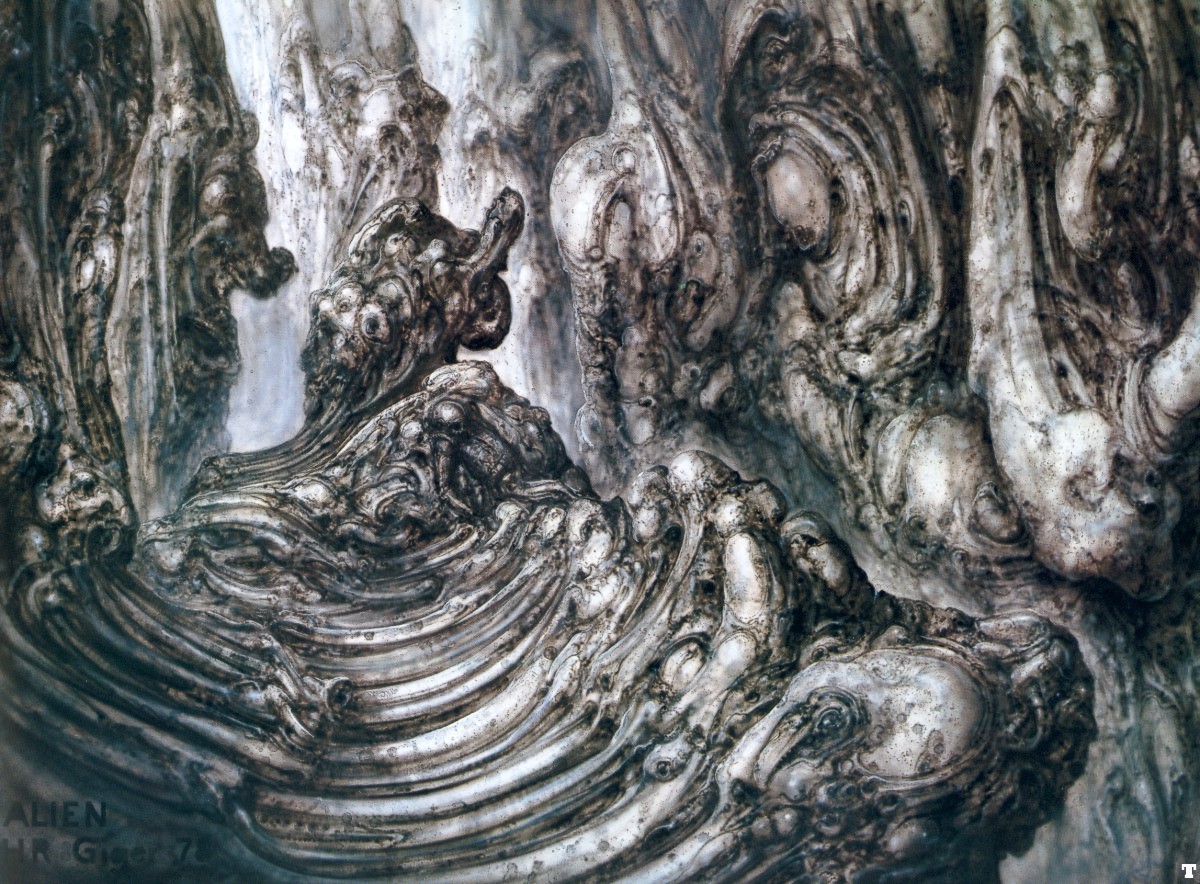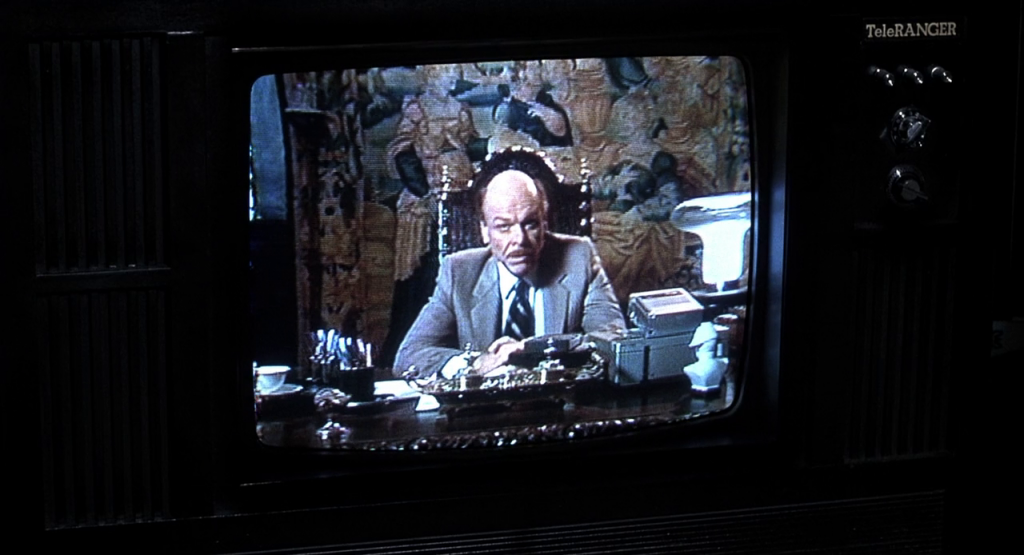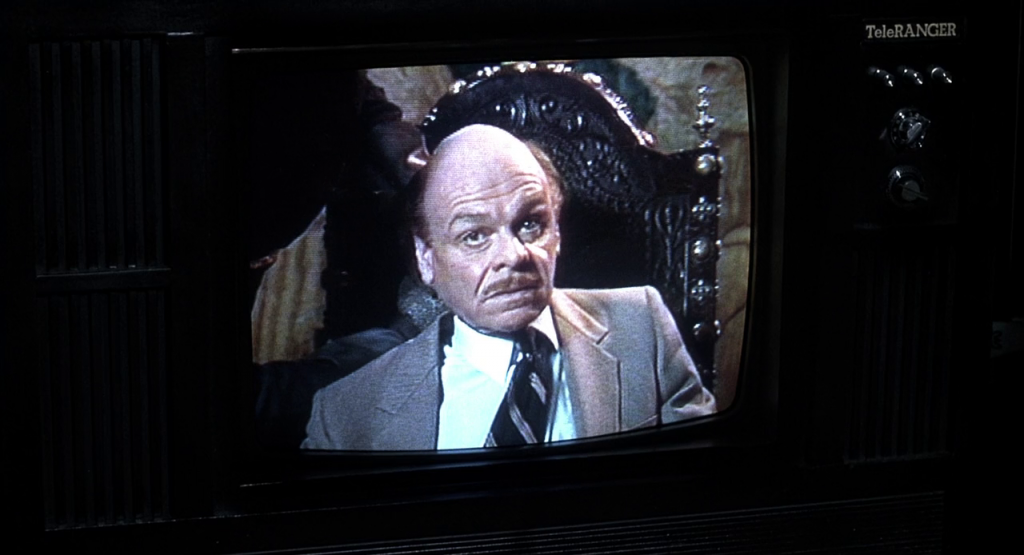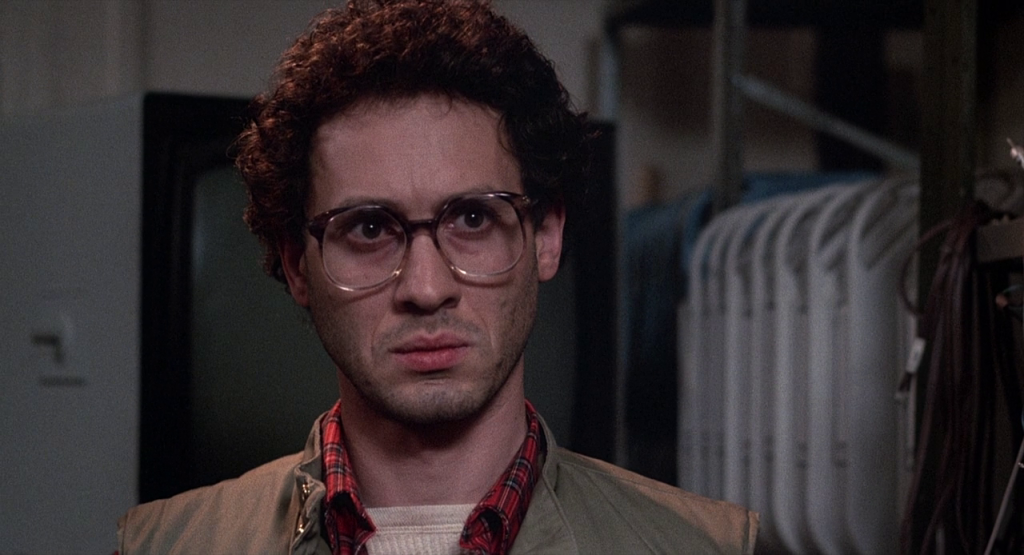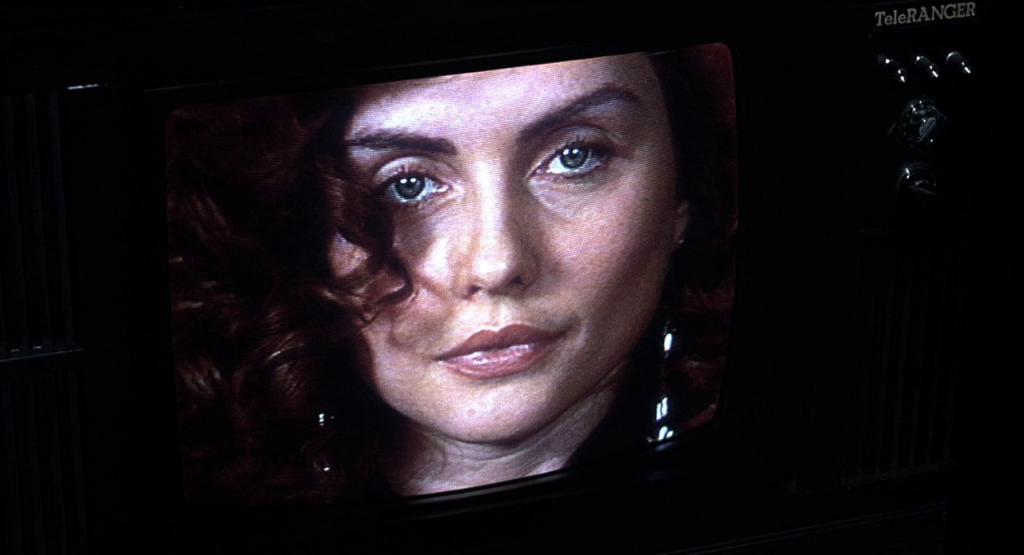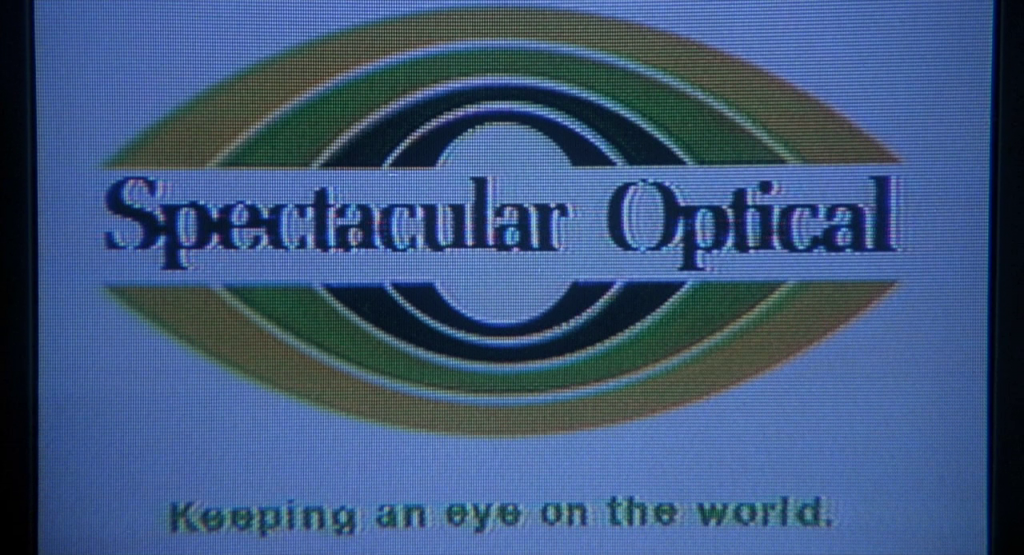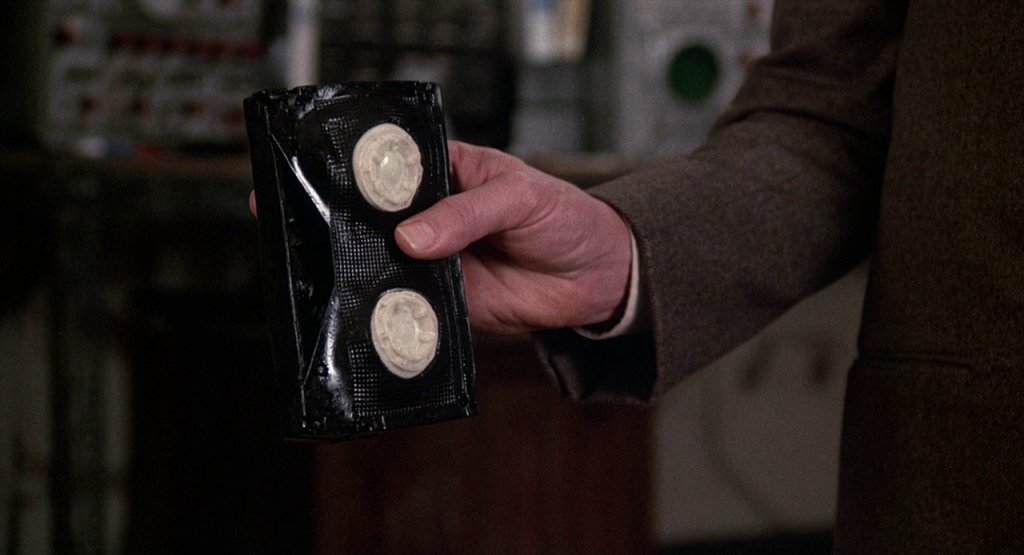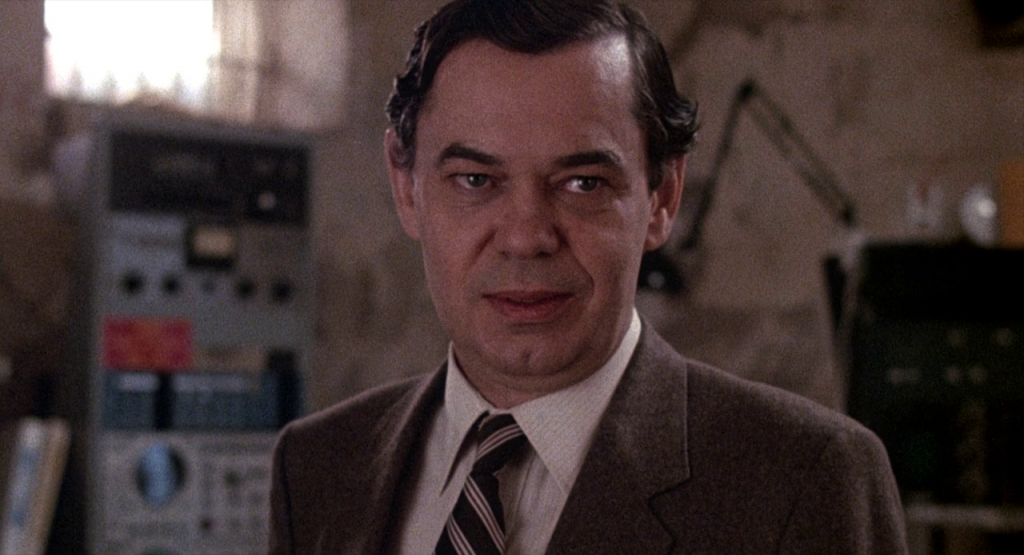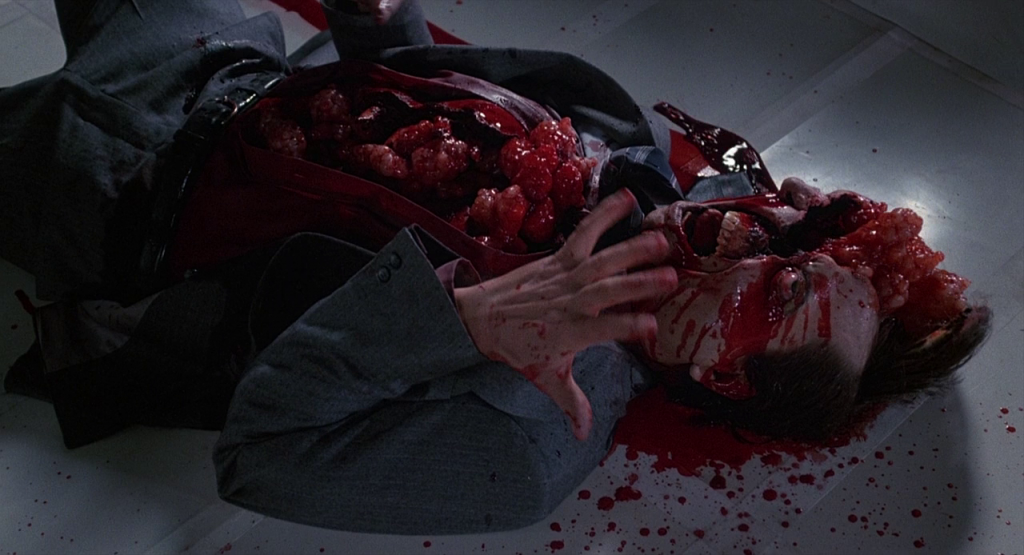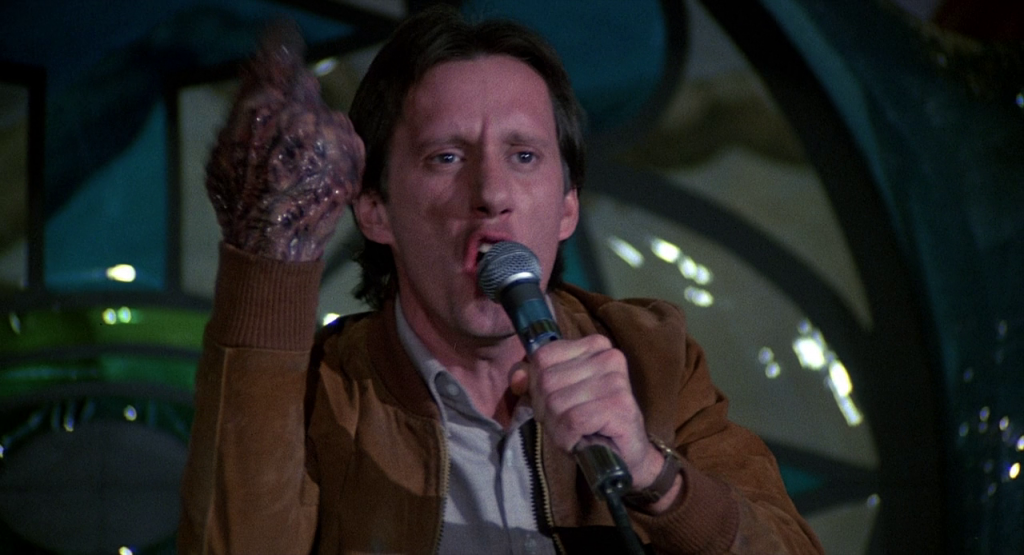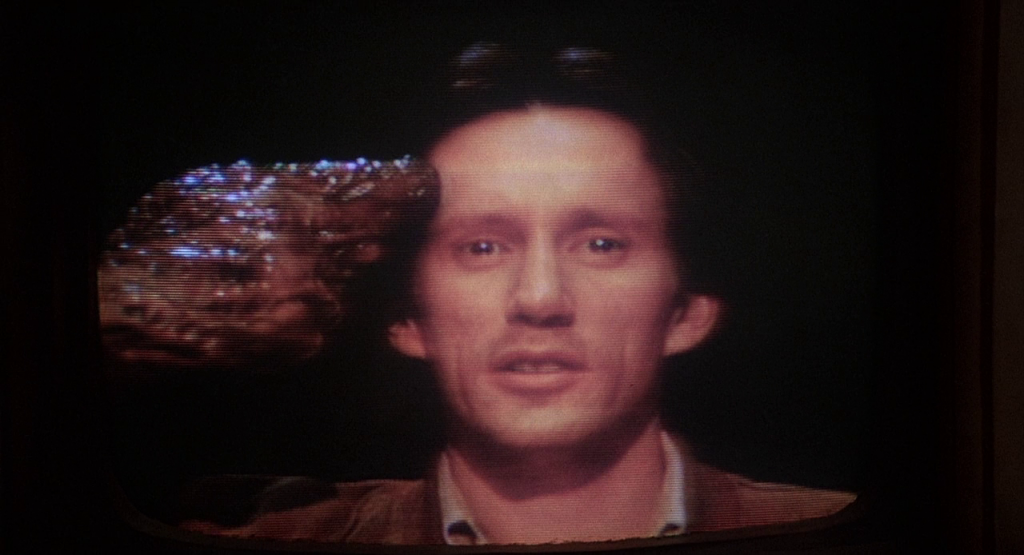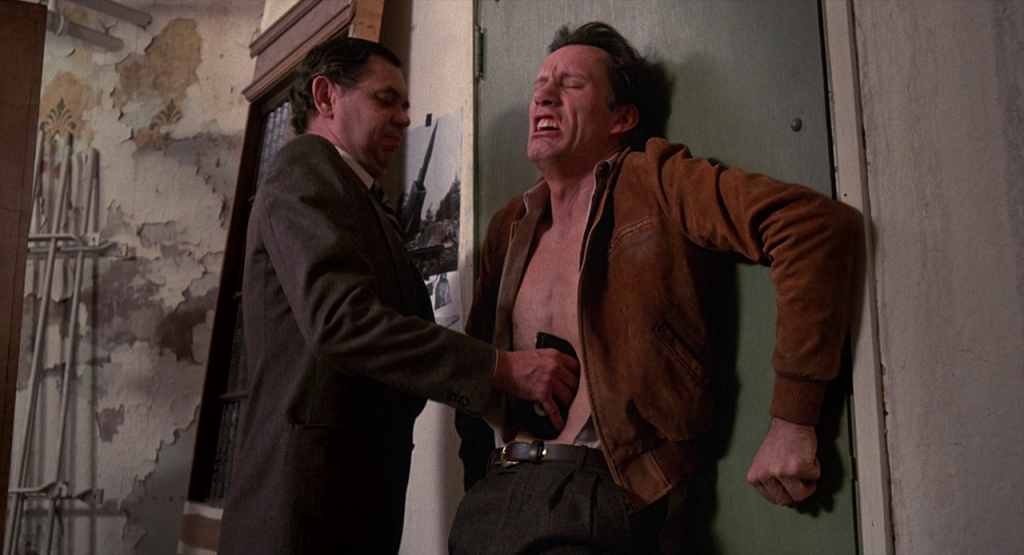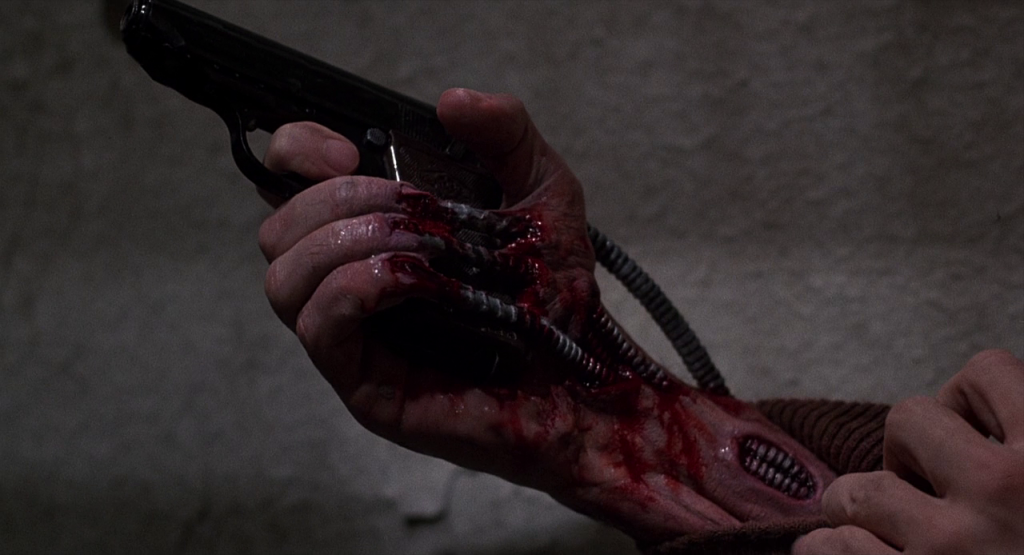According to David Cronenberg’s Videodrome (1983), we live in the midst of an occult or psychic war – “the battle for the mind of North America.” Underlying the epiphenomenal worlds of economy and sexuality, there are actually two philosophies in conflict, each vying for control of the future.
Call the first Videodrome; call the second the New Flesh.
Consider the timeline constructed by the film. Intriguingly enough, the film controls information about its reality to such an extent that Max Renn, the protagonist, and the viewer both learn about what’s going on at exactly the same rate. The trajectory of the film implies a thorny ascent from a position of manipulated ignorance to the brink of epistemic and even ontological transformation. Either become a programmed assassin for Videodrome, or kill the old flesh. “You’ve gone as far as you can with the way things are.”
Some time ago, the media theorist Dr. Brian O’Blivion and his colleagues discovered the Videodrome signal, which stimulates the formation of new organs in the human body. (Recall Cronenberg’s early fascination with the theme of a “creative cancer,” or the impersonal productivity of venereality.) In its initial form, the Videodrome signal produces radical ontological mutations in the flesh and psyche alike. As his daughter Bianca reports, O’Blivion saw Videodrome as “as part of the evolution of man as a technological animal.” However, his partners disagreed, instead seeing Videodrome as a potential means of perceptual and psychic control dwarfing all others. As O’Blivion relates to Max in a central piece of exposition, “The television screen is the retina of the mind’s eye. Therefore the screen is part of the physical structure of the brain. Therefore, whatever appears on the television screen emerges as raw experience for those who watch it. Therefore, television is reality, and reality is less than television.”
One of the reasons why Videodrome can seem a little dated is because concerns about television, per se, have largely waned in favor of concerns about our own media ecology – the attentional impact of handheld devices, the potential autonomy of artificial intelligence, or the surveillance capacities of smart technology. It’s precisely this datedness, however, that introduces a needed element of distantiation into the film. If you replaced all the televisions in Videodrome with something more contemporaneous, the point the film makes would be obscured by its apparently timely critique of a specific technical object (e.g., “cellphones are dangerous”). It’s a mistake to think that Videodrome’s reliance on a televisual register dates it. To the contrary, by relying on a largely outdated technical form, it makes its general argument possible – “It bites.” / “What kind of teeth do you think it has?”
So what is the substance of this general argument? On the one hand, O’Blivion makes evident the degree to which human beings are irreducibly technical animals. The Videodrome signal is not an invasion from outer space, or some kind of supernatural incursion. Rather, it’s a development in human technics – even biotechnics – as is every technological artifact from fire to the face transplant. Every mutation in technics generates a new distribution of possible human futures. Consequently, it’s perhaps unsurprising that every mutation in technics ends up serving as a theater of war. The war gets fought over the shape of the human and its capacity for action (or lack thereof). This is one reason why O’Blivion appears to efface the sharp distinction between the human subject and the Videodrome signal as such. On the other hand – although we could make the case that media and technics are ultimately identical – the perceptual emphasis of Videodrome accelerates its effects – “the visions coalesce and become flesh, uncontrollable flesh.” It may be that all technical objects stimulate the flesh in new ways. Videodrome, however, externalizes not only some aspect of the subject’s interiority, but also initiates a positive feedback loop that inexorably leads toward threshold instability. As O’Blivion observes, “The battle for the mind of North America will be fought in the video arena, the Videodrome.” What comes next depends on who wins.
Needless to say, O’Blivion’s partners murdered him in order to seize control of this strange and protean new technics.
This is when the occult or psychic war truly begins. The masks worn by each of the combatants – the two philosophies mentioned above – are the corporation Spectacular Optics (“We make inexpensive glasses for the Third World and missile guidance systems for NATO”) and the Cathode Ray Mission. In the film, the primary spokespeople for each are Barry Convex and Bianca O’Blivion, respectively.
Shortly before the start of the film Spectacular Optics decides that Max is the ideal test subject, in part because he is the president of a small alternative television station, Channel 83, or Civic TV. To acquire him, they implant a mole in his company, a young technician named Harlan. Note the tenor of the relationship between Barry, the shark-eyed corporate ideologue, and Harlan, the moralistic young conservative revolutionary (“North America is getting soft, patrón. And the rest of the world is getting tough. Very, very tough. We’re entering savage new times, and we’re going to have to be pure and direct and strong if we’re going to survive them. Now, you and this cesspool you call a television station, and your people who wallow around in it, and your viewers who watch you do it… You’re rotting us away from the inside. We intend to stop that rot”). Doesn’t this alliance remind you of something? If Harlan existed today, he’d be a bitter young computer programmer who spends his free time complaining about “SJWs” and retweeting false statistics that purport to show how the gender pay gap isn’t real. Just like today, Spectacular Optics holds the reactionary’s leash.
Let’s talk about Max. Max is the average subject of late capitalism. Despite the superficial appearance of complicity (or even sleaze), he seems like a decent enough person (observe how Bridey, Max’s personal assistant, interacts with him). Mostly, he thinks about business, but his goals exist at an entirely different scale than do those of Spectacular Optics. He’s seeking survival, perhaps competitive advantage or even something like legitimacy, but the drive to dominate does not motivate him. After Harlan exposes Max to the Videodrome signal, his desires begin to reconfigure, amplified and refracted through his sexual relationship with the apparently sadomasochistic Nicki Brand. More so than any other character in the film, Nicki’s ontological status is uncertain. On the one hand, she serves as Max’s ironically dark reflection. The irony, of course, stems from the fact that, while Max’s Channel 83 sells “everything from softcore pornography to hardcore violence,” Nicki’s own radio program (“The Emotional Rescue Show”) sells a different flavor of therapeutic illusion. The media sells both dreams and the interpretation of dreams. So it’s very funny but also totally unsurprising that Max and Nicki hook up. On the other hand, many of Max’s interactions with Nicki take place in a libidinal underground, an irreal zone resembling the stage Max sees when first exposed to the Videodrome signal. As Bianca tells Max much later, “They killed her, Max. They killed Nicki Brand. She died on Videodrome. They used her image to seduce you but she was already dead.” Nicki exists largely instrumentally, then. She is always an imago. First, she is an accelerant or catalyst of the mutations Videodrome initiates in Max, and, second, she haunts Max’s altered consciousness like a red specter of desire. “Come to me, Max. Come to Nicki.” By the end of the film, Nicki’s role has come undone, as it were. She is no longer a tool used by Spectacular Optics, but the externalization of Max’s desire to become radically otherwise, to become the New Flesh.
A question recurs throughout the film. What is Videodrome? What is Videodrome? What is Videodrome? Insofar as Videodrome belongs to Spectacular Optics, we can answer the question directly.
In short, Videodrome is two things.
First, it’s a libidinal weapon, a medium of control intended to stimulate and exploit everyone exposed to it. It awakens desires you didn’t even know you had, then feeds them back to you in an endless hallucinogenic loop. Time to copyright the unconscious. Mutations in desire generate mutations in the real. In other words, it’s a machine for producing even more precisely manipulable corporate subjects, locked up inside minds that have been turned into gimp suits. You don’t stand a chance, because now even your desires flow against you. Spectacular Optics is here to change the way we see everything; it’s here to change the very nature of desiring-production. Ironically, Videodrome isn’t even all that new. It’s new only insofar as it’s the final form of a product line that’s been in development since apes first contracted the language virus. You could say the arc of history bends toward Videodrome, for “Videodrome is death.”
Videodrome is also a place. It’s the infinite beige nightmare of a psychic landscape shaped by the imperatives of capital – or, at least, it’s the image of such a place. Consider a possible utopia for corporations, in which the mutability of the flesh is perfectly governed, in which everything under the sun is yoked to the Company dime. “If it were possible to do so, the company would sell what all businesses of its kind dream about selling, creating that which all our efforts were tacitly supposed to achieve: the ultimate product – Nothing. And for this product they would command the ultimate price – Everything.” Here, Allied Mastercomputer is only a sysadmin. “The machine masturbated and we had to take it or die,” and they can take away your mouth for good. Every dream home a desiring-machine, each one plugged into a vast circuit diagram shitting out profits into the void; every Catherine wheel a cog in a workplace engine for Cenobites. Slap a coat of bland new paint on it, open up a fresh instance of Microsoft Excel, and this is the kind of sick shit that gets Barry Convex off. “We’d like to keep using you until you’re all gone. Open up to me…” That, and making sure you think all this is somehow your fault. “Why would anybody watch a scum show like Videodrome? Why deny you get your kicks out of watching torture and murder?” Look at that little smirk, like a young Ted Bundy alone in a room with a beloved pet. And he’s going to get away with it, scot-free.
Except that he doesn’t.
Note what happens to Barry’s body after Max kills him. It’s ground zero for some kind of radical proliferation, as if Barry himself were only a puppet of Videodrome. His death releases all the chained-up latencies of the body, which grotesquely shatter the human shell. Kill the jailer, and the prisonhouse goes wild. It isn’t just the revenge of the video made flesh, but a testament to the wild ontology of the New Flesh itself.
On the face of it, Spectacular Optics is opposed only by the Cathode Ray Mission. Run by Dr. O’Blivion’s daughter, Bianca, the Cathode Ray Mission appears to be a cultic organization dedicated to exposing people to unqualified media effects – in order to “help patch them back into the world’s mixing board.” What is the world’s mixing board if not the body without organs? In fact, the Cathode Ray Mission is the sole institution actively trying to ward off the advent of Videodrome. It does this precisely by tapping into the very source and substance of radical ontological mutation – that is, the signal that makes Videodrome possible. The occult or psychic war I’ve been describing looks like a dualism, in which two distinct forces attempt to assert conflicting visions of the world order. But it’s important to recall that the Cathode Ray Mission and Spectacular Optics are fighting over the underlying signal – the source of whatever alteration. We know it as Videodrome in the first place only because Spectacular Optics looks like it’s winning. It looks like it’s winning, of course, until Bianca successfully deprograms Max and he becomes the video word made flesh. “Now that you are the video word made flesh, you know what you have to do. You’ll turn against Videodrome. You’ll use the weapons they’ve given you to destroy them.” In this latter statement, you can see the degree to which the war is not just a media war, but a war over the very mode of ontological production, using its own technical means. The master’s tools are neither holy nor profane; they are tools that can be used to various ends by anyone who seizes them.
What, then, is the New Flesh? Answering this question definitively is difficult because the film ends at the very moment of its arrival. “To become the New Flesh, you have to kill the old flesh.” After the climax of the film, Max flees, having assassinated Barry Convex at the glammy product expo of a new line of designer frames – the Medici line. (Note the parallel between how Spectacular Optics instrumentalizes Videodrome and the two quotes from Lorenzo de Medici selected to headline the expo: “Love comes in an the eye” and “The eye is the window of the soul.”) He flees to a transit zone, namely, the old harbor and an abandoned boat – as if striking out for a new territory from a ruin (or moving from the ruin of the old flesh to some unknown destination). There, the televisual specter of Nicki instructs Max on what to do next. Ostensibly, she convinces him to kill himself. Much turns on how we interpret these closing scenes, but there is also much to interpret.
For example, we see Max kill himself twice. The first time, he does so within the frame provided by a television screen. The second time, however, he again kills himself within the frame provided by a television screen – the viewer’s. If Max is indeed the video word made flesh, then there is no reason to interpret this final transformation in the dreary terms of a cult suicide or a broken tool, cast aside. To the contrary, there is an almost Nietzschean aura to his behavior, as his apparent suicide dispenses with one form of subjectivity in order to make room for another. In this world, as we have seen – both in the morbid productivity of Barry’s corpse and even in the case of Brian O’Blivion’s distributed existence in the Cathode Ray Mission’s extensive video archive – “death is not the end.” In a weird echo of Spinoza on immortality, death is not the end because the impersonal vitality of the flesh necessarily survives the transient person who only embodies that vitality for a time.
Indeed, in Videodrome, bodies do not cohere and perdure as we conventionally expect. Consider the matter of the gun with which Max is forced to kill his partners at Channel 83. The film alternates between depicting the gun, memorably fused to Max’s flesh, and showing us that he carries no gun at all. Obviously, Max shoots them with something, but asking after the status of the gun in question misses the point, for it occupies a strange ontological position. The gun is integrated into his body – perhaps it was always there, like the latent aggression that every body carries – but it is also a parasitic weapon, an expression of the weaponized program that Videodrome implants or stimulates in Max from the very start.
But we can be even more precise. What is the New Flesh? The New Flesh is not merely a generic invocation of the revolutionary capacities of the body – as if to say the following: What can a body do? A body can, or will, eventually exceed and overthrow whatever regime of control despotizes it. There’s more to it than this, however. The New Flesh expresses a liberatory ontological trajectory, yes, but it also informs a distinct political program of contestation and active resistance. It is the real that animates not only a body politics and a media politics, but a politics that threatens to occupy, appropriate, explode, transect, transform, dissect, and reconfigure the societies of control that constrain and perpetuate our sorry condition as the nth victims of Videodrome. In part, this involves the refusal to cede any territory to the enemy at all – concepts, biology, memetics, technics. These are some of the territories we lose when we hide behind supposedly “critical” insights like these: philosophy is hegemony, biology is determinism, memetics is Kulturkrieg, technics is alienation, or Gestell. We forget we are fighting over reality itself. This involves actualizing the difficult truth that “there is no need to fear or hope, but only to look for new weapons.”
